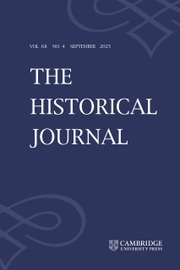(image source: Cambridge Core)
Abstract:
This article uncovers a transimperial culture of petitioning that eased the transition for subjects who moved between the French and British empires. Although the petition was hailed as the birthright of Britons, and has consistently drawn attention from historians of Britain and its empire, this did not mean that petitioning was unknown elsewhere. Indeed, Quebec, which was transferred from France to Britain at the close of the Seven Years’ War (1756–63) and experienced lengthy periods of both French and British rule, provides an ideal site through which to document written traditions of expressing grievance. This article reveals not only that French subjects were familiar with addressing the monarch well before the British conquest, but also suggests an important continuity of form that transcended differences of language, shifting regimes, and imperial rivalries. The analysis of petitions from Quebec both before and after 1759 testifies to an identifiable commensurability in the lived experiences of inhabitants across the French and British empires, just as it underscores the petition's similar function in the overseas colonies more broadly. The petition's value to both subjects and sovereigns – its role in mediating relations between them across the globe – helps to explain its continued relevance in these two monarchical empires.(read more on Cambridge Core)


No comments:
Post a Comment